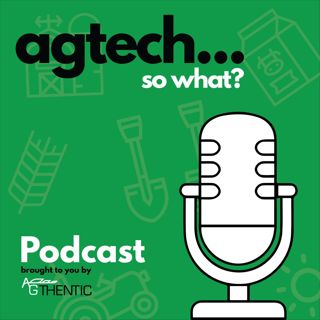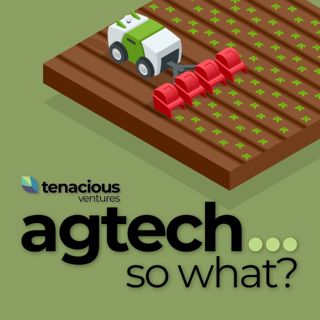
Is the Future of Farming Hands-Free?
For some, the concept of hands-free farming is terrifying; for others, the prospect is game-changing and exciting. But, is fully autonomous farming really possible?In this episode we chat with Kit Franklin, senior lecturer in agricultural engineering at Harper Adams University in the UK, who in 2016 set out to prove an entire crop cycle could be done autonomously. The project was called Hands Free Hectare, which later expanded into Hands Free Farm after garnering worldwide attention and for producing what is believed to be the first crop to be planted, cultivated, and harvested - completely autonomously.While Kit started this farming experiment simply to prove robotic farming was possible, how transferable is his autonomous trial crop to the real world? And is it how we want to be farming our food in the future?In this episode, Kit discusses:The role autonomy can play in making small-scale farming viable and lowering chemical use.How media exposure of even a small scale project can change perceptions of agriculture and attract unlikely entrants to the industry.The key enablers required for autonomy to take off, and the business models that may bring it to scale.For more resources from this episode, visit our website.
28 Juli 202139min

Biologicals and chemistry: finding ways to commercialize the science
Just because something can be done, doesn’t mean it should be. In agtech, this is a reminder that no matter how cutting edge the science or technology, when it comes to commercialization, functionality and novelty are simply not enough. This is especially true in the complex area of chemistry and the emerging industry of biologicals.This episode features two scientists who, instead of viewing the publication of their research as an end point, have made it the beginning of a venture-backed startup journey. Dr. Jacqueline Heard, CEO of Enko Chem, a US agtech startup that has raised over $50M to develop novel crop protection solutions, and Dr. Nancy Schellhorn, CEO of RapidAIM, a Tenacious Ventures portfolio company that spun out of Australia’s CSIRO, join us to discuss:The journey from researcher to founder within the deeply technical landscape of ag inputsThe challenges of transitioning from scientist to venture-backed startup founderTwo business models that, as mentioned in Part 1 of this series, are helping overcome some of the challenges in bringing new inputs to marketFor more resources, please visit our website.
14 Juli 202140min

BONUS EP: Capitalism for Good, feat. David Lee from AppHarvest and Impossible Foods
Can capitalism be a force for good? David Lee left the traditional corporate world to work for some of the most bullish startup companies in agrifood tech, including Impossible Foods and AppHarvest, where he was appointed the company’s President earlier this year. David did this out of a belief that the levers of capitalism and consumerism are the fastest ways to transform the food system. He says the key to address the world’s urgent food sustainability problems is by creating consumer movements.In this bonus episode, David speaks to Sarah as part of fireside chat at the recent Future Food Asia 2021 conference. They discuss:The role of impact investing in agrifood tech, including using venture capital and SPACs (special purpose acquisition companies), and why David believes ‘funding failures’ is okay.Why changing consumer behaviors around food is so difficult.The growing opportunities for agrifood tech, particularly in Asia.Thanks to ID Capital, the organizer of Future Food Asia, for hosting the discussion and providing us the audio. For further resources, visit our website.
7 Juli 202128min

Biologicals: snake oil or science, and how do we know?
Farmers are under pressure to shift toward lower chemical intensity production. Biologicals are touted as one possible solution, promising natural, chemical-free alternatives to inputs such as fertilizers and pesticides. But biologicals also have a reputation for being ‘snake oil,’ with companies making claims that seem too good to be true, or that don’t stack up outside the lab.So what’s the science behind biologicals, and how do we know they work? And when they do work, how do we get them in the hands of more farmers?This episode features Jarrett Chambers, founder and President of ATP Nutrition, a Canadian plant nutrition company, and Shane Thomas, agronomist and author of Upstream Ag Insights, to discuss:What biologicals are, and how to think about the different categoriesWhat’s driving interest in biologicals from farmers, agribusinesses, and investors.What characteristics, business models, and incentives can help ensure biologicals fit into established farming systems.How digital tools can be used to bring credibility to the biologicals marketFor more resources from the episode, visit our website.
30 Juni 202142min

What's caused the farmer protests in India and what does it mean for innovation in Ag?
Agriculture in India has been thrust onto the international stage as the world watched and celebrities tweeted about the tens of thousands of farmers camped out in Delhi to protest against governmental reforms which loosen rules around the sale, pricing, and storage of produce. Farmers say these changes prioritize corporate interests and threaten livelihoods, but Prime Minister Narendra Modi argues they will lead to greater efficiency and ultimately income for smallholder farmers.In this episode, Sarah is joined by colleague Komal Patel to unpack why farmers are protesting, what’s working (and what’s not) in India’s agricultural system, and what it means for agtech and innovation. It features:Mekhala Krishnamurthy - Senior Fellow at the Center for Policy Research and Associate Professor of Sociology and Anthropology at Ashoka University.Venky Ramachandran - agritech consultant and author of Agribusiness MattersThe discussion covers:How can India open up agricultural markets without hurting the livelihoods of its farmers?How can public policy incentivize agtech and private investors, while also ensuring a fair system that doesn’t just benefit the powerful?The slippery slope of policy reformsHow India’s agricultural system can move forward sustainably and successfullyFor more information and resources, visit our website. We would also love your feedback! Fill out our super quick survey on what you’d like to hear more about on the podcast (and thank you!).
16 Juni 202132min

Bonus Episode: The five forces shaping the future of food and ag, with Sarah Nolet
We’d all like to be able to predict what the next big technological disruption or trend will be. But while we can't exactly do that, we can look at signals happening today, and use them to drive our thinking about the future. In this bonus episode, Sarah Nolet presents five future forces shaping innovation in food and agriculture, and shares insights about what these forces mean for producers, investors, and entrepreneurs today.You may know Sarah as the host of this podcast, but in this bonus episode you’ll hear a slightly edited version of a keynote talk she gave based on research Agthentic Advisory conducted for AgriFutures Australia.In this talk, Sarah examines the interconnecting technologies, trends and market signals which are poised to change how society produces, eats and even conceptualizes food.The five forces she discusses are:Viral disinformation in the food systemInterconnected digital infrastructureRewiring the gridDomesticating the cellNew geographies of climate changeThis keynote address was given as part of the Digital Innovation and Smart Agriculture festival, in Hamilton, Victoria (Australia). Audio courtesy of the Southern Grampians Shire.We want your feedback! Fill out our short survey, so we can make sure we're delivering you the content you want to hear. Thank you!
9 Juni 202134min

Sustainable Supply Chains: eliminating waste and unlocking business opportunities
Agrifood value chains are known for their efficiencies: they’ve been optimized to grow, process, and deliver massive amounts of safe food all over the world. But efficiency is no longer enough. Consumers and investors want supply chains that are climate resilient (or positive), sustainable & ethical, and free from waste.How can we deliver against these pressures? What changes in technology and practices will be needed? How do we build trust so consumers and industry alike have confidence in the sustainable promises farmers, companies & brands make?In this panel we examine how farmers can capitalize on the increasing value of growing sustainable food, the opportunities for new players and new technologies to remove food waste and packaging from the supply chain, and signals indicating that the mood around sustainability might be about to shift.Our guests include:Olympia Yarger, CEO and Founder, GoterraJessica Vieira, Senior Director of Sustainability, Apeel SciencesLachlan Monsbourgh, Head of Sustainable Business Development, RabobankThis episode is an edited version of a recent AusAgritech Meetup, sponsored by Foodbytes! by Rabobank and brought you by the Agthentic Group, Sprout X and Platfarm. For more information visit our website.We want your feedback!! We’d love to hear what you want to hear more of on this podcast, so we’d appreciate it if you could fill out this short (we promise!) survey.
2 Juni 202139min

Lean Farming - Jana Hocken brings Toyota's famous operating model to agriculture
Jana Hocken is a dairy farmer and “lean farming” consultant. After an international career in engineering and lean manufacturing at Toyota, Jana moved to a farm in New Zealand with her husband. At the time, she knew very little about agriculture. But, after witnessing inefficiencies on her own farm, such as people regularly making multiple trips to the same paddock, she quickly realized the principles of lean could be applied. Jana has now released her own book and training materials, to help other farmers work smarter.In this episode Jana speaks about:How lean has revolutionized farming at her 1000 cow dairy by increasing team involvement, improving systems, and getting rid of inefficient practices.How adopting lean has allowed their farm to experiment with and adopt more technologyLessons in how to bring your team along with you through changesThis episode is hosted by Sarah Nolet and Kirsten Diprose (an Australian farmer interested in using the lean principles and a member of the Agthentic Group team). For more resources from this episode visit our website.
19 Maj 202139min






















